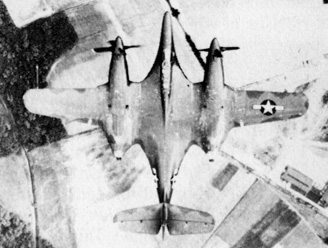McDonnell XP-67 "Bat"




(color image source: Collect-Aire Models)
The XP-67 was a somewhat revolutionary design by McDonnell Aircraft. It used two turbo-charged engines whose exhaust was ejected at the rear of the engine nacelle, providing some additional thrust. The pilot was to sit in a pressurized cabin, and the plane's armament was very heavy for a fighter (six 37mm cannon in one prototype, and a 75mm cannon in another prototype). When viewed from above the aircraft had an unusual profile, in that the engine nacelles and fuselage were shaped to provide true aerofoil sections throughout. The first flight was made in January 1944, with testing undertaken later that year. Performance proved to be far from satisfactory, and modifications were made to improve certain stability problems. Before official trials could resume, however, the prototype was extensively damaged by fire and the program was abandoned.
For more data on this aircraft, click
here for Joe Baugher's
webpage.
USAF archives on this aircraft, click
here.
To acquire a model of this aircraft: Collect-Aire
Models
Additional information on this aircraft
can be found at Wikipedia
here.
(updated February 2009)
McDonnell XP-67
Type: single-seat long-range fighter
Crew: 1
Armament: six 37mm cannon or one 75mm cannon
Specifications:
Length: 44' 9.25" (13.65 m)
Height: 15' 9" (4.80 m)
Wingspan: 55' 0" (16.76 m)
Wing area: 414 sq. ft (38.46 sq. m)
Empty Weight: 17,745 lb (8049 kg)
Max Weight: 25,400 lb (11,5321 kg) max at takeoff
Propulsion:
No. of Engines: 2
Powerplant: Continental XIV-1430-17/19 contra-rotating inlines
Horsepower: 1350 hp each
Performance:
Range: 2385 miles (3838 km)
Cruise Speed: N/A
Max Speed: 405 mph ( 652 km/h) at 25,000 ft
Ceiling: 37,400 ft (11,400 m)
If this page does not have a navigational frame on the left, click HERE to see the rest of the website.